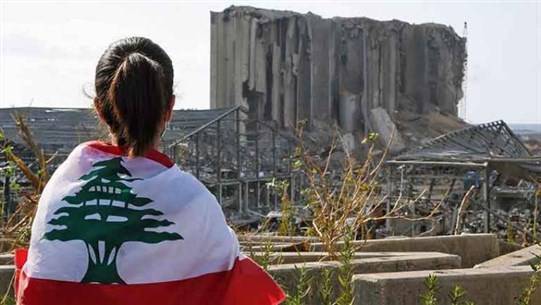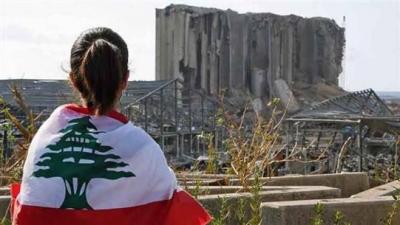On the eve of the first anniversary of the suspension of the judicial investigation into the Beirut port explosion, the President of the Supreme Judicial Council, Judge Souheil Aboud, is studying legal solutions to reinstate the investigating judge, Judge Tarek Bitar, to his work and resume the case from its current status. Judicial sources have indicated that Aboud "is exploring several interpretations to bring the investigation back to motion, the most notable being the revival of the General Assembly of the Court of Cassation by appointing delegated judges to head the cassation courts as members of the General Assembly, without the need for a decree to appoint the heads of the cassation courts, which is frozen by a political decision."
Sources disclosed to "Asharq Al-Awsat" that Aboud "will invite next week the original and delegated heads of the cassation courts to hold a session for the General Assembly of the Court of Cassation and start studying the recusal lawsuits filed by politicians against Bitar, as well as ruling on the recusal lawsuits filed against judges in the cassation responsible for looking into Bitar's recusal requests, which resulted in freezing investigations and procedures since December 23."
The head of the judicial authority's endeavor is based on several factors, the most important being the necessity of completing the investigation to clarify the truth about the port explosion and its causes, providing justice to the victims' families, placing the Lebanese public before the truth of the explosion and who caused the death of innocents and the destruction of the capital, and also adjudicating requests for the release of the 17 detainees whose case has become a public issue.
The sources noted that "the safest and shortest way to resolve all these issues is by allowing Bitar to return to his work, as he is the main reference knowledgeable about the case and was close to concluding the investigations. Additionally, Bitar is the most suitable person to decide on the release of the detainees, rather than appointing a substitute investigating judge who would be susceptible to doubt and face recusal lawsuits that would tie his hands."
The new attempt to break the cycle of hindering the investigation is neither a spur-of-the-moment decision nor a recent one. The judicial sources viewed it as a "true translation of Judge Aboud's promise that he would not remain idle in the face of attempts to undermine the investigation of the largest crime Lebanon has witnessed." They clarified that "this decision has been under discussion with the original and delegated heads of the cassation courts over the past two weeks." They added that "there are four original heads of cassation courts and four delegated ones, and a meeting of five of them is sufficient to ensure the quorum of the General Assembly of the Court of Cassation to convene and issue its decisions on the recusal lawsuits against Bitar and the other judges."
However, a legal source following this effort expressed skepticism about the level of optimism. They feared that "this step might not be guaranteed." The source explained to "Asharq Al-Awsat" that "three judges from the four delegated presidents, Najib Eid, Janet Hanna, and Randa Kfoury, are facing recusal and recusal lawsuits, thus they should not participate in the session of the General Assembly." The legal source also stated, "Judge Majid Mazihim has the right to participate as a member of the General Assembly, which would complete the quorum, but who guarantees Judge Mazihim's attendance amidst the fierce conflict over such a serious case?"
Meanwhile, Minister of Justice in the caretaker government, Henry Khoury, is working to reactivate the investigation, considering the interests of the victims and their families as equal to those of the detainees who have been held for two years and three months. Close sources to the Minister indicated that "the insistence on appointing a substitute investigating judge does not arise out of spite or scoring points, but rather from purely humanitarian motives." The sources confirmed to "Asharq Al-Awsat" that "the letter the minister sent to the High Judicial Council requesting approval to appoint a substitute investigating judge was based on a prior agreement with Council President Judge Souheil Aboud." They pointed out that "the suggestion of Judge Samiranda Nassar's name for appointment as an investigative judge came from a list previously approved by Aboud, which includes eight judges who all refused for various reasons, except Nassar, who accepted, thus her name was proposed."
The President of the Judicial Council continues to oppose the appointment of Judge Nassar due to her political proximity to the "Free Patriotic Movement" and her previous criticism of Judge Bitar's procedures and his pursuit of politicians in the port case. He prefers presenting another name characterized by neutrality and objectivity.
According to close sources to the Minister of Justice, there is a view that "the suggestion of an alternative name can only occur after the High Judicial Council unanimously or by a majority rejects the appointment of Nassar and notifies the minister in writing, which has not yet occurred." Sources close to Minister Khoury emphasized that he "is particularly concerned about the humanitarian aspect regarding the detainees, especially since most of them are elderly and suffer from chronic ailments and unstable health conditions." They revealed that Minister Khoury "previously discussed with the President of the Judicial Council the negative implications of any harm that might befall any of the detainees, emphasizing that the judiciary cannot bear the repercussions of the death of any detainee among them, especially since the majority or perhaps all of them have exhausted the period of preventive detention and may have already served the sentence they would receive."
"Awareness of recent developments" indicates that the Lebanese Ministry of Justice "recently received a letter from the Directorate of International Organizations, Conferences, and Cultural Relations, requesting information from the Lebanese government about four cases of arbitrary detention." Reports indicate that the letter "was delivered from the working group concerned with arbitrary detentions to Lebanon’s permanent mission in Geneva, which handed it over to the Lebanese Foreign Ministry and it was referred to the Ministry of Justice. The international organizations request from the Lebanese government to provide them with any information available about the detention of Shafik Marri (former Director General of Customs), Hassan Qareethem (former Head of the Port of Beirut), Badri Daher (current Director General of Customs), and Hanna Faris (Director of Beirut Region in the Customs Department), in connection with the investigation into the port explosion." The letter did not explain the reasons for selecting these detainees specifically.
Furthermore, sources close to the Minister of Justice indicated that he "receives regular inquiries from the American and Canadian embassies in Beirut, requesting explanations regarding the continued detention of individuals in the port case who hold the nationalities of both countries." They noted that "the priority for the Minister of Justice is to resolve the requests for the release of the detainees either positively or negatively, to eliminate all these questions," emphasizing that "the release of the detainees or those who deserve it does not mean undermining or obstructing the investigation in any way."




